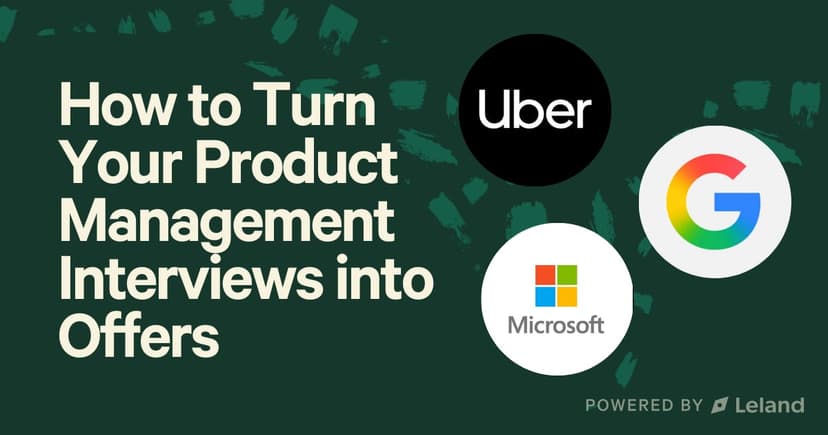Data Product Manager Interviews: Questions & Tips
Prepare with confidence using real examples, expert tips, and top data product manager interview questions—all in one tactical guide.
Posted September 8, 2025

Join a free event
Learn from top coaches and industry experts in live, interactive sessions you can join for free.
Table of Contents
The role of a data product manager isn’t just about shipping features; it’s about making data products that create meaningful, measurable impact. In today’s tech landscape, where teams rely on data analysis to inform every decision, companies are looking for PMs who can turn complex data insights into actionable insights that align with business objectives, improve user engagement, and drive revenue growth.
This guide breaks down the data product manager interview process, drawing from top industry guides, firsthand prep advice (including this Quora thread), and our experience coaching candidates into top tech companies like Google, Meta, and Amazon.
Read: The Different Types of Product Management: An Overview of Specialist PM Jobs
What Interviewers Are Really Looking For
Interviewers aren’t just looking for someone who can recite common product manager interview questions or handle technical prompts. They want to see whether you can think strategically, lead cross-functionally, and use data to drive real business outcomes. Top candidates demonstrate a deep understanding of data product management—how to design data products that align with business objectives, improve user engagement, and deliver measurable value. They can clearly define and track key performance indicators, communicate effectively with both non-technical stakeholders and engineers, and lead cross-functional teams with clarity. They also bring hands-on experience with tools like Google Analytics, data visualization platforms, and scalable data management systems. Most importantly, they have a track record of turning complex data analytics into clear product decisions that move key metrics and improve customer satisfaction.
Pro Tip: Most interviewers want to understand the candidate’s ability to make decisions when data is unclear, messy, or contradictory. Always highlight how you handle trade-offs and ambiguity.
Common Data Product Manager Interview Questions and How to Master Them
Whether you're preparing for a startup or interviewing at Google, data product manager interviews typically fall into three categories: behavioral, technical, and product strategy. Here's how to think like a top candidate, frame your answers, and stand out in each.
Behavioral Questions: Show How You Think and Lead
These questions test your leadership, decision-making, and communication skills, especially when navigating ambiguity, trade-offs, or team dynamics.
Common prompts:
- “Tell me about a time you prioritized a feature with fewer users but high strategic value.”
- “Describe a situation where user feedback changed your roadmap.”
- “Give an example of how you drove user engagement through data.”
Use the STAR method—but elevate it:
- Situation: Briefly set the context, including product, team, and user base.
- Task: What was the challenge or business objective?
- Action: Detail how you involved cross-functional teams, which tools you used (e.g., Google Analytics, Amplitude), and how you approached data analysis, user behavior, or data quality concerns.
- Result: Tie outcomes to key performance indicators, user engagement metrics, or customer satisfaction, and be specific.
Example answer:
“In my last role, our onboarding process was seeing high drop-off. I ran a funnel analysis using Google Analytics and heatmaps to identify friction points. Collaborating with design and engineering, we simplified the flow and personalized messaging based on behavioral triggers. Post-launch, user retention increased by 18% and NPS rose by 12%, directly impacting our quarterly KPIs.”
Pro Tip: Great behavioral responses don’t just show what you did, they also reflect how you think, prioritize, and collaborate. Top candidates weave in their understanding of product strategy, data product management, and cross-functional collaboration.
Read: The 10 Most Common Product Management (PM) Behavioral Interview Questions
Technical Questions: Demonstrate Data Fluency and Decision-Making
These questions evaluate your ability to interpret, validate, and apply data. You don’t need to be a data scientist, but you do need to demonstrate technical expertise and a structured approach to turning data into decisions.
Sample prompts:
- “How would you measure success for a new dashboard feature?”
- “How do you ensure data quality in a machine learning product?”
- “What are your preferred data visualization tools, and why?”
What to highlight:
- How you define relevant metrics and key areas to monitor
- How you collaborate with data scientists, analysts, or engineers
- Your comfort with technical skills like SQL, experimentation tools, and data management frameworks
- How you validate assumptions with user feedback, A/B testing, or Google Analytics
Example framing:
“I begin by aligning with the team on what success means. Is it improved engagement, efficiency, or revenue growth? From there, I define key performance indicators and ensure tracking is clean, often involving QA for event data and double-checking schemas. I visualize results in Looker or Tableau, depending on the stack. If the product involves machine learning, I also partner closely with data scientists to monitor drift and feature performance.”
Pro Tip: Always bring it back to the business objectives. Technical depth is valuable, but what really matters is your ability to use data to inform product decisions, prioritize features, and drive outcomes.
Product Strategy & Product Sense Questions: Connect Vision to Execution
These questions test whether you can think like a PM: balancing user needs, business goals, and technical feasibility.
Example prompts:
- “Design a data product for restaurant owners.”
- “Prioritize features for a customer insights dashboard.”
- “How would you improve customer satisfaction in a declining product?”
Your approach should cover:
- Framing the problem clearly - What’s the user's pain point? What are the business constraints?
- Defining success - What are the key metrics and business objectives?
- Prioritizing features - What delivers the most value fastest? Where are the trade-offs?
- Thinking cross-functionally - How will your solution impact engineering, design, and ops?
- Using data to back up decisions - Reference specific data points, user feedback, or market benchmarks.
Always tie your response back to outcomes: How will your product improve user engagement, operational efficiency, or revenue? How do you plan to measure success?
Example Answer:
“Let’s say I’m designing a data product for independent restaurant owners who want to optimize operations and increase profitability. First, I’d frame the core user need: many small restaurant owners lack the time or expertise to interpret raw data across POS systems, delivery platforms, and reviews. They want a simple, actionable view of performance.
The business goal might be to reduce churn among restaurant clients using our SaaS platform. So I’d define success as increasing weekly active usage, improving customer satisfaction scores, and reducing account cancellations. Key metrics could include daily logins, report downloads, and engagement with revenue-driving insights.
To prioritize features, I’d use a value vs. effort matrix. I'd start with a dashboard summarizing sales trends, top-performing menu items, labor efficiency, and review sentiment. More advanced features like forecasting or benchmarking would come later.
From a cross-functional standpoint, I’d align with design on UX simplicity, with engineering on integrating third-party data sources, and with customer success to ensure the insights resonate with user pain points.
Finally, I’d validate all assumptions with user interviews, user feedback, and a pilot rollout. I’d use data points like feature adoption and retention post-onboarding to iterate.
Over time, I’d expect the product to improve operational efficiency, drive revenue growth for our clients, and increase LTV for our business.”
Pro Tip: Use structured thinking, but don’t be robotic. The best candidates show empathy for users, alignment with strategy, and an instinct for building what matters most.
Read: Product Execution Interview Guide: Common Questions & Answers, Expert Tips, & Mock Interview
How to Prepare for a Data Product Manager Interview: Tactical, High-Impact Steps
Preparing for a data product manager interview means going beyond generic PM prep and building mastery in product thinking, data fluency, and stakeholder communication—all under the lens of measurable business impact. Here’s how top candidates structure their prep to stand out in interviews at companies like Google, Meta, and top startups.
Study the Full Interview Flow—Company by Company
Start by mapping out the full interview process for each company you’re targeting. For data PM roles, this often includes a recruiter screen, a technical round focused on metrics or SQL, a case or product strategy round, and multiple behavioral interviews with cross-functional peers. Pay special attention to how the data PM track might differ from general PM paths—for example, expect heavier emphasis on data analysis, data quality, and defining key performance indicators tied to real product outcomes.
Build a Story Bank Tailored to Data PM Scenarios
Generic STAR stories won’t cut it. You need 5–7 high-signal examples that reflect your ability to lead with data. That includes:
- A time you defined key metrics to align a product with business objectives
- A situation where you improved data quality or surfaced complex data insights to drive decisions
- A project where you collaborated with data scientists, analysts, or ML engineers to ship a data-powered feature
For each, practice framing not just the what and how, but the why and tie it to metrics like user retention, customer satisfaction, or operational efficiency.
Practice Answering Out Loud—With Data-First Framing
Data PMs are expected to communicate clearly across disciplines. That means explaining trade-offs between business value and data complexity, or breaking down data visualization tools, experimentation results, or data management concerns to execs and non-technical peers. Practicing out loud forces you to sharpen how you explain the decision-making process, structure technical answers, and pivot gracefully under follow-up questions.
Sharpen Your Tools and Your Thinking
Refresh your familiarity with Google Analytics, Amplitude, Looker, or whatever stack the company uses. Go deeper than just using dashboards. Practice generating actionable insights, assessing data quality, and identifying gaps in tracking. Also:
- Study agile methodologies and how they apply to cross-functional collaboration in data-driven environments
- Read top blogs or research from data PMs and teams at companies like Airbnb, Stripe, or Spotify
- Attend events like the Strata Data Conference to stay fluent in real-world trends around data science, machine learning, and product strategy
- Create mock cases: for example, analyze how much revenue a feature drove or how to redesign onboarding based on drop-off metrics and user feedback
Get Targeted Coaching from Someone Who’s Done It
Working with a coach who specializes in data product management interviews can 10x your prep. They’ll run mock interviews that reflect the depth and ambiguity of real conversations, help you refine your answers based on company expectations, and stress-test your logic, metrics framing, and product strategy. Especially for PMs transitioning into more data-heavy roles, coaching closes gaps quickly and with focus.
Browse top product management coaches here.
Real Candidate Insights: What Google PM Interviews Are Like
Candidates on Quora mention:
“Expect to be asked open-ended questions and have to justify every assumption with data. They’re evaluating your thought process, not just your final answer.”
“Behavioral questions were huge, especially around cross-functional collaboration and handling conflicting priorities.”
These interviews often focus on how you:
- Define and track key performance indicators
- Explain complex concepts to non-technical peers
- Derive insights from noisy data and adjust your product strategy accordingly
Read: How to Get Into the Google APM Program
Final Checklist: What Sets Top Data PM Candidates Apart
Before you walk into your interview, make sure you can confidently check all of these:
- Have you shared examples that show real collaboration with data scientists, especially on machine learning or data-heavy initiatives?
- Can you clearly explain how you aligned with business teams to define success using relevant key performance indicators?
- Are you ready to communicate seamlessly with execs, engineers, analysts, and designers, adapting your depth and framing to each audience?
- If asked a technical question, can you demonstrate fluency with APIs, data pipelines, and experimentation platforms without over-engineering your response?
- Do your stories reflect how you’ve improved the company’s products by combining sharp product sense with actionable, trustworthy data?
If you can nail each of these, you’re operating at a level that hiring managers at top tech companies expect from their next data PM.
Final Thoughts
Succeeding in a data product manager interview means showing that you can think strategically, act tactically, and communicate clearly. Whether you're aiming for a startup or one of the top tech companies, prepare for a mix of behavioral, strategic, and analytical discussions—where your goal is to turn data points into decisions that matter.
If you are looking for a personalized prep, work with an experienced product management coach who specializes in product management interviews, from mock interviews to storytelling frameworks. Also, check out our free events and group classes for more strategic PM insights!
Read these next:
- Product Sense Interview: What It Is, Questions, & Tips
- Product Design Interview: What It Is, Questions, & Tips
- How to Nail the Atlassian APM Interview
- How to Ace Your Capital One Product Manager Interview
- The North Star Framework: How to Define and Achieve Product Success
- How to Write a Powerful Product Management Cover Letter
- 20 Common System Design Interview Questions (With Sample Answers)
- Product Manager Resume: The Ultimate Guide (With Examples & Template)
FAQS
What tools or platforms should I be familiar with for a data PM interview?
- Be ready to talk about tools like Google Analytics, Amplitude, Looker, Tableau, SQL, and anything related to data visualization, tracking, or experimentation.
How do I talk about data science projects as a product manager?
- Focus on the business problem, your role in shaping the product direction, and how you worked with data scientists. Emphasize your understanding of the models, your contribution to defining success metrics, and how the model improved the product.
What metrics should I mention in a data product manager interview?
- Mention key performance indicators (KPIs) like user retention, customer satisfaction, activation rates, engagement metrics, and operational efficiency, depending on the product’s goals.
How do I explain data quality or data issues in an interview?
- Be specific. Talk about how poor data led to the wrong assumptions or decisions, how you identified the issue, and what steps you took to improve data quality or tracking reliability.
Do I need technical skills to pass a data PM interview?
- You don’t need to code, but you should understand SQL basics, how data flows through your systems, and how to ask smart questions in technical conversations with engineers or data scientists.
Can I get a data PM job without a data science background?
- Yes, but you need to show that you’re comfortable working with data, translating insights into product strategy, and partnering with technical teams to deliver impact.
Browse hundreds of expert coaches
Leland coaches have helped thousands of people achieve their goals. A dedicated mentor can make all the difference.



























